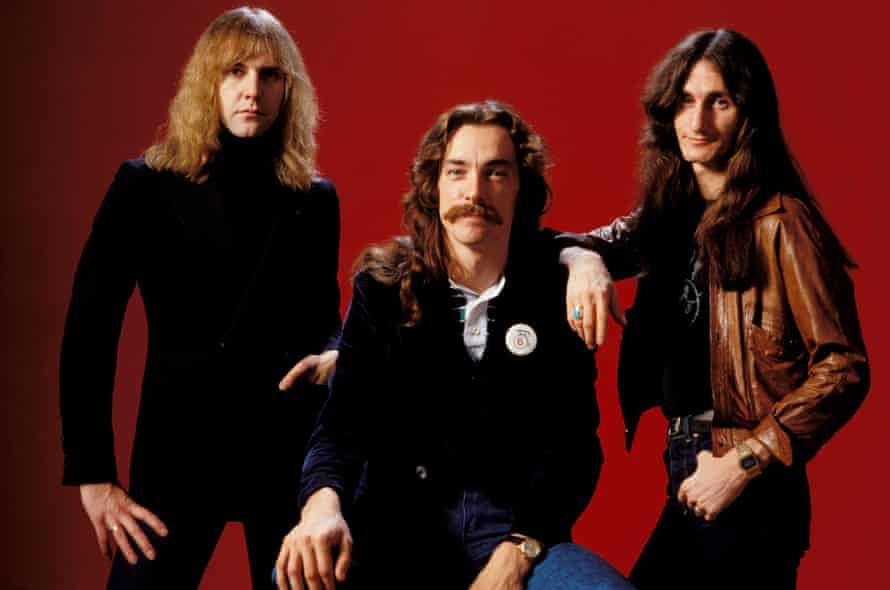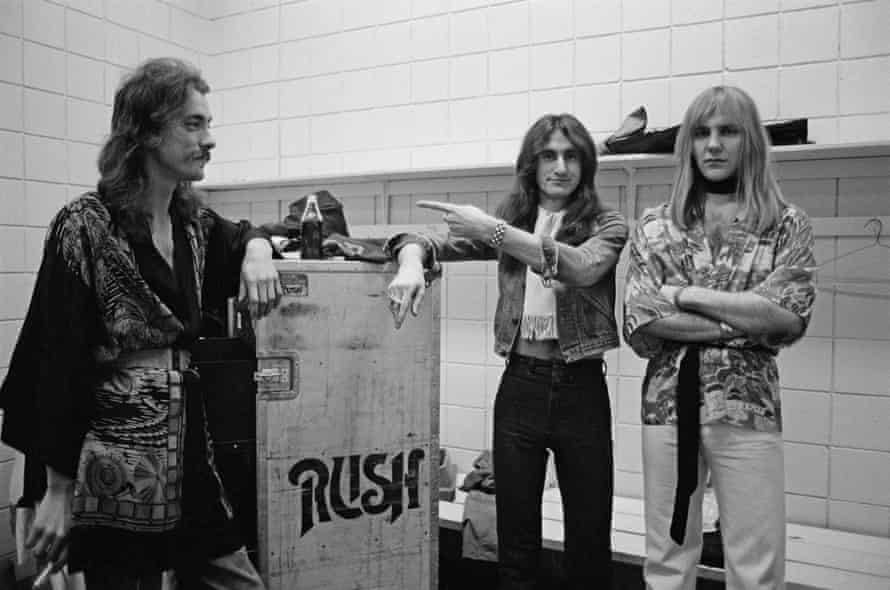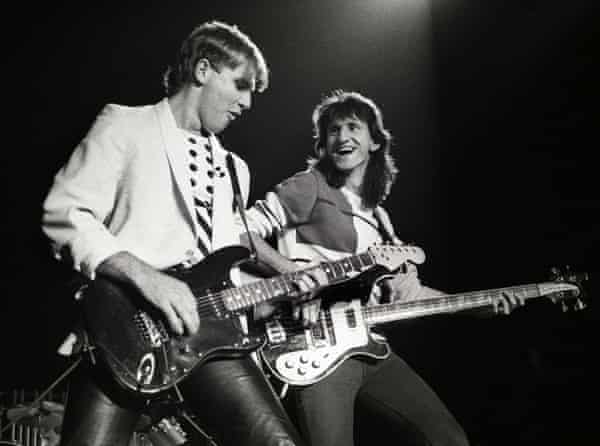what was the song that wmms used to play at the beginning of every weekend
I t'southward nice that the three members of Blitz are still friends. Three and a half years after the prog ring's concluding bear witness together, Geddy Lee, Alex Lifeson and Neil Peart haven't gone their split means. "Alex and I but flew downward to see Neil two weeks ago and hung for a couple of days," Lee says, surrounded by the detritus of high tea in i of London's k but discreet hotels. "The first couple of months [later on they disbanded], we were emotionally hungover. Nosotros didn't know where the future was going to have us so we didn't talk a ton then. And then we started to communicate over again."
Without Blitz to sing and play bass for, Lee has kept himself decorated compiling a coffee table book – Geddy Lee's Big Beautiful Book of Bass – which sounds similar ane for a niche audition. And then once again, that's what people thought about Blitz and they ended up filling arenas for twoscore years and joined the Rock and Curl Hall of Fame, so who knows? The book goes to one side, though, as Lee surveys the career of the only prog ring to have had a Hollywood bromance written around them.
Finding My Manner (1974)
The young Rush were rather out on their ain, Canada not having many bands trying their easily at progressive hard rock. "Nosotros were playing a lot of loftier schools," Lee says. "Y'all'd pull up in Magnetawan, Ontario, fix your gear and start playing and the oversupply would exist looking at y'all to say: 'What is this? I can't trip the light fantastic toe to this!' So nosotros started by being unpopular on the loftier school circuit. And and then, when we turned 18, nosotros became unpopular on the bar circuit because we were also loud."
They recorded their debut anthology, Rush, in tardily-night sessions – after playing five sets a night at a Toronto bar called the Gasworks – simply to detect the initial mixes were "wimpy and weak. When we heard it we were heartbroken." Terry Brownish was brought in to remix, and asked the band for more songs. "One of them was Finding My Way. Nosotros played him the song, and he loved it. 'OK, let's record that and one other song, and we'll remix the others,' he said. And that became the tape. Finding My Fashion became a symbol to me of saving our kickoff album."
2112 (1976)
What transformed Blitz from callow Led Zeppelin copyists into prog titans was the replacement of drummer John Rutsey with Neil Peart. "He was one of the goofiest looking guys I'd ever seen. He was very tall, lanky. He collection upwardly in this little sports car, drums hanging out from every corner. He comes in, this large goofy guy with a modest drumkit, and Alex and I idea he was a hick from the country. Then he saturday down behind this kit and pummelled the drums – and us. Every bit far as I was concerned he was hired from the minute he started playing."
Peart suited Lee and Lifeson'southward desire to brand more complex music. Even better, he was happy to write the lyrics. The album 2112 was a last curl of the die for Rush with their label, Mercury: "They really wanted us to be Bad Company 2 and we had loftier aspirations, so we stayed away from that and insisted on our own way of doing things. We were prepared to get down with the transport, and we almost did."
Incredibly, 2112 was the making of the band, with fans flocking to its championship track, a sidelong suite about (deep breath) how the priests of the Temples of Syrinx command life in the Solar Federation, and the struggle of the protagonist to express his individuality after discovering a guitar. It was inspired past Ayn Rand, which led to accusations that Blitz were rightwing propagandists. "Nosotros were very, very surprised," Lee says. "We were influenced by Ayn Rand, yes, but to me The Fountainhead was an artistic manifesto. The whole idea of that time in our lives was that nosotros were trying to write original textile and we didn't want to compromise. The Fountainhead gave me comfort. When that whole thing came out in the printing it seemed to take an odd political bent to it, which wasn't really where we were at."

La Villa Strangiato (An Exercise in Self Indulgence) (1978)
"That was a vocal where I would have to say our ideas exceeded our ability to play them," Lee says of the nine-and-a-half-minute, 12-function instrumental suite that set new standards for bands hoping to get widdly woo on their instruments at peachy length. "Nosotros thought: 'We're going to write this long slice and and then we'll just record information technology alive off the flooring and boom!' Simply it was really hard. It was beyond us. I included information technology here because it surprised me how pop that song was amongst our fans. They but love it when we go into that crazy way. Yes, it is an indulgence, only it seemed to be a pivotal moment for u.s.a. in creating a fanbase that wanted us to exist that way."
Rush's commitment to noodling made them the dream ring for an audience that was overwhelmingly male. "There's no getting around that," Lee says. "Nosotros would joke about it backstage. 'Come across whatever girls in the front row?' 'No. Some attractive boys. A lot of ugly boys.' When things started changing – and they did – nosotros noticed: 'There's girls in the front row'. Or there'd be a sign in the back: 'Mythbusters: Girls who honey Rush.'" Lee sighs, and laughs. "But we were too sometime to take advantage of it by that point."
Tom Sawyer (1981)
Lee didn't want to include Tom Sawyer. "Only how could I non? Information technology changed our lives." Tom Sawyer became a staple of classic stone radio, and regularly crops up in popular culture – Futurama, The Colbert Written report, Freaks and Geeks, Family Guy, Southward Park. In the motion picture I Honey You, Human being, information technology took a central role as the gum that binds Jason Segel and Paul Rudd (Rush themselves made an appearance, too). "When [the director] John Hamburg approached us virtually it, our instincts were to say no. But we were going through a phase where we decided to take the George Costanza arroyo to our career. We decided that anything we were going to say no to instinctively, we would at present say yes to. Information technology served us very well."
Through all the years Peart was in Rush, Lee never wrote a lyric. He was always the vehicle for Peart'due south words. "It has felt odd at times," he says. "It has felt very comfortable at times, at times very uncomfortable. Being an interpreter for Neil has been a singular pleasance of mine and a really difficult task at the same fourth dimension, because I'g non always on the same folio as him. Every bit we grew as a band, I became trusted by him to be his sounding board and his editor, and if I couldn't get into a thing, he would go out it lonely. That'due south the beauty of a relationship that lasts."
Roll the Bones (1991)
Through the 80s, Rush sidelined Alex Lifeson's guitar and foregrounded synthesisers, but Roll the Bones saw a shift back. "Alex was driving at that point and he made it very clear we were drowning under a synthy racket and he wanted the guitar to return to its rightful position," Lee says. "That's fine. It unburdened me in a fashion. I accepted that maybe I had taken information technology a bridge too far." Lee suggests he was always the to the lowest degree assertive member of the ring, that at first Peart was the most strong-willed of the trio, so "I retrieve as our relationship evolved, Alex became more than of the guy to convince, and Neil and I relaxed into our roles." He smiles. "I simply realised that."
This is a rare Rush track that is, in Lee's words, "rhythmically relaxed. Information technology was really a way of calming down. Rush has a trend to play very hyper, very fast. We were but not very good at playing in a relaxed country. Roll the Basic was our respond to that."
Grace to Grace (2000)
Within 10 months between the summer of 1997 and summer 1998, Neil Peart lost his daughter (killed in a car blow) and his partner (to cancer). He retreated completely, and Lee assumed that was the stop for Rush, and recorded a solo anthology. "Afterward a couple of years I found solace in working and writing. I really did captivate over information technology and coffin myself in it. Neil was then powerfully running abroad from all that pain that it was understandable to me if he didn't desire to return to the things that reminded him of the life that had been stolen from him. I didn't think he would return, so this was a saviour for me."
What Lee discovered, recording in Seattle with younger musicians including Matt Cameron of Soundgarden and Pearl Jam, was that he and Rush were loved. "I wasn't used to that. All the local Seattle musicians of the time dropped by to say howdy. They wanted to pay their respects, and I didn't realise that I was iconic to them and the music they'd grown up with. Having grown upward with no existent music scene and no interaction with other musicians, to suddenly be in the middle of a thriving musical community was very good for me. I enjoyed the hell out of that experience."

Headlong Flight (2012)
Blitz did return, for three more albums, and they came full circumvolve on their final record, another grand concept piece from Peart – Clockwork Angels – which also led to two novels and a series of comics. So, Geddy Lee, take y'all ever been able to make sense of any concept albums? "Not really." Non fifty-fifty your own? "Barely. I grew up listening to Yep. I still tin't tell you what any of those records are about, honestly. I don't think information technology matters, because the music and the lyrics create a sound, and that gives you a picture of a meaning. Sometimes that'southward enough to make you love it."
And have you e'er idea, the i affair that would make this album better would be a novelisation? Lee laughs. "… or a graphic novel, and and so the picture, and so the TV series, and and so the cartoon. Information technology was not my thought. I liked the concept of that record and I practice believe information technology's our best work. It was a tough tape to make lyrically, getting it down to something that Alex and I could live with, that told enough of the story to satisfy Neil's concept. There'southward something near Headlong Flight that's almost about the history of my ring to me. It'due south autobiographical in a way. Forty years into this career, and it goes past similar that. The sentiment in that song is 'I wish I could do information technology all once more,' and information technology's truthful."

Working Man (2015)
A live recording – from their final bout – of the vocal that was Rush's breakthrough when it was picked up by WMMS in Cleveland in 1974. "It was my favourite vocal to play every dark, and that's why I wanted to include the live version." It was also the final song Rush played at their final prove, on i August 2015. Did Lee know at the time that was the end? "Not 100%. Neil was pretty adamant it was, and he played it like it was going to be the final evidence. And that's why he really left the drum throne and came out and gave united states a hug on stage, which he swore he would never do. I guess I was a flake of an optimist. Just nope. I think Alex accepted it more as the stop. I thought nosotros really killed it that night, simply it was hard to tell because it got really emotional in the concluding 20 minutes. That'due south the first time I ever got choked up at a microphone. And so I guess a part of me knew.
"I miss playing with Rush. I don't miss travelling with Rush. I miss being on phase with those guys considering it was a singular laurels to me. I'm sure I will play live again i day, but it will never replace that intensity of what a three-hr Rush show was like to perform: it challenged me to my max and that's rare in this life."
Geddy Lee's Big Beautiful Book of Bass is published past Harper Design
Lee has curated a longer primer to Rush'due south work, featuring the in a higher place tracks alongside other favourites from across their career; yous tin mind and subscribe to the playlist in Spotify below
Source: https://www.theguardian.com/music/2018/dec/24/geddy-lee-on-rush-greatest-songs
0 Response to "what was the song that wmms used to play at the beginning of every weekend"
Post a Comment